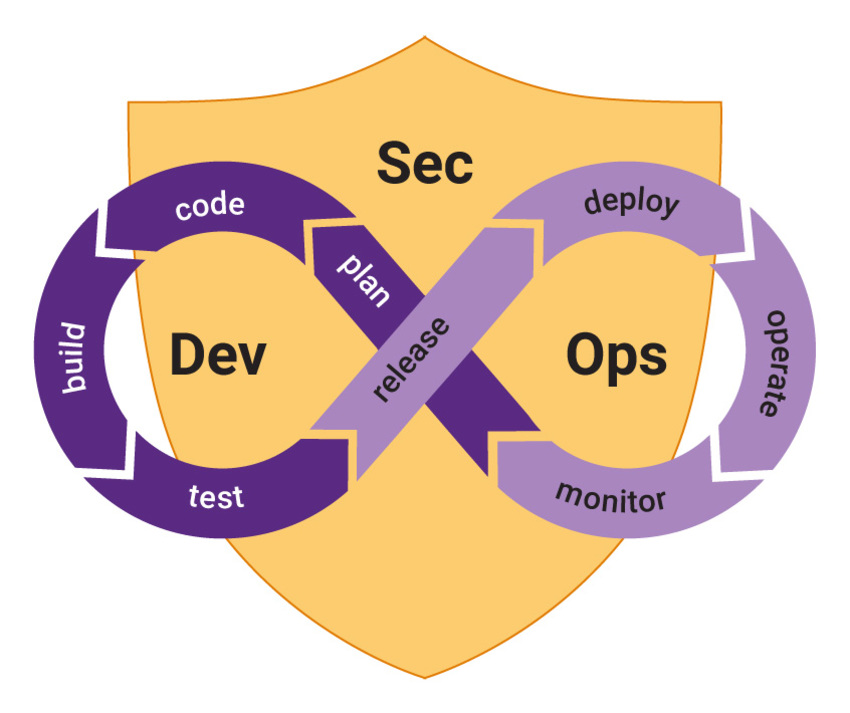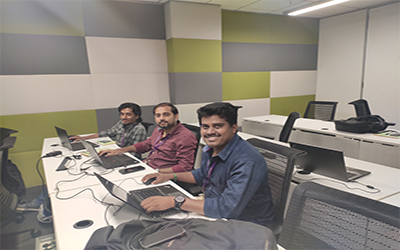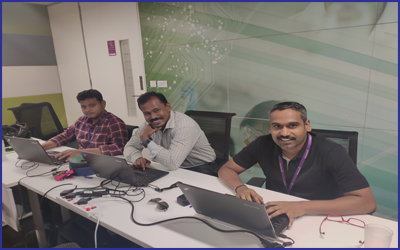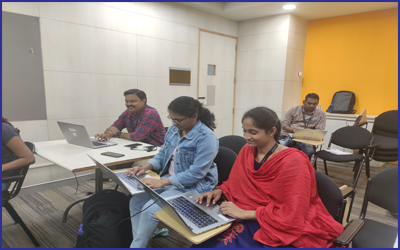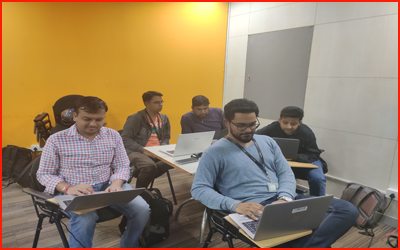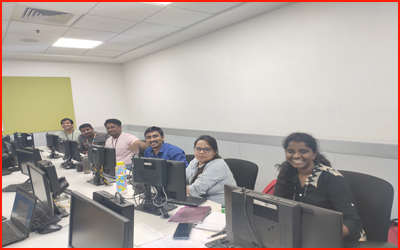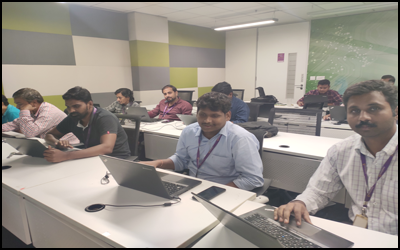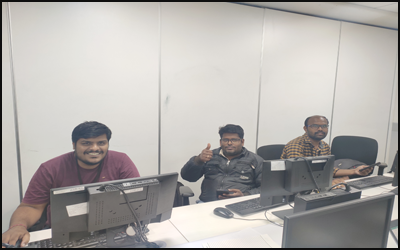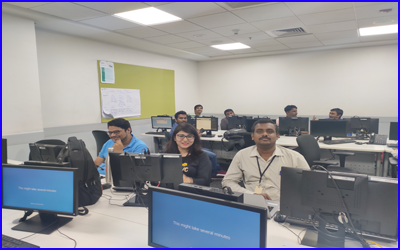8000+
Certified Learners
15+
Years Avg. faculty experience
40+
Happy Clients
4.5/5.0
Average class rating
What is DevSecOps On SAP?
DevSecOps on SAP integrates the principles of DevSecOps with SAP application development and lifecycle management to create a secure, automated, and efficient environment for SAP deployments. DevSecOps is an extension of the DevOps methodology that incorporates security at every stage of the software development lifecycle (SDLC), from design to development, testing, deployment, and operations. In the context of SAP systems, DevSecOps focuses on embedding security practices directly into the SAP DevOps pipeline, ensuring that security vulnerabilities are addressed proactively throughout the development process rather than as an afterthought.
DevSecOps on SAP aims to automate the application of security policies and practices in the SAP landscape. The primary goals include:
-
Continuous Integration and Continuous Deployment (CI/CD) with Security: DevSecOps on SAP integrates security testing into the CI/CD pipeline, automating security checks as part of the application development process. This helps to identify vulnerabilities early in the development cycle.
-
Automation of Security Patches and Updates: SAP systems are often complex, and security patches or updates must be tested and deployed rapidly. DevSecOps helps to automate the process of applying these updates, ensuring that SAP environments remain secure without manual intervention.
-
Infrastructure as Code (IaC): Security controls can be built directly into the configuration of SAP landscapes using Infrastructure as Code, ensuring consistent and repeatable security practices across environments.
-
Threat Monitoring and Incident Response: DevSecOps ensures that continuous monitoring and incident response processes are in place to quickly detect and respond to security threats in SAP systems. Real-time monitoring can help identify potential risks, while automated incident response can mitigate them.
Why Apache Camel Training is Important?
DevSecOps training for SAP professionals is essential as it ensures that security is deeply embedded throughout the SAP development lifecycle. With increasing regulatory requirements, sophisticated cyberattacks, and the growing complexity of SAP systems, organizations must prioritize security to protect their valuable data and ensure business continuity.
Key reasons why DevSecOps on SAP training is important:
-
Proactive Security Management:
Security threats are constantly evolving, and SAP systems are prime targets for cyberattacks due to their central role in business operations. By incorporating security into the development and deployment pipeline, organizations can detect and resolve security issues early, reducing the risk of costly breaches and downtime. Training enables teams to integrate these security practices effectively into SAP workflows. -
Compliance with Regulatory Standards:
Organizations operating in highly regulated industries (e.g., finance, healthcare) need to comply with standards like GDPR, HIPAA, and SOC 2. DevSecOps on SAP training helps professionals ensure that security controls are consistently applied to meet regulatory requirements, minimizing the risk of non-compliance and penalties. -
Reduced Risk of Vulnerabilities:
Security vulnerabilities in SAP systems can lead to severe consequences, including data breaches, financial losses, and reputational damage. DevSecOps training educates teams on how to automate vulnerability assessments, penetration testing, and security patching, reducing the chances of vulnerabilities remaining undetected. -
Building a Security-First Culture:
Security should not be a bolt-on feature added at the end of the development cycle. DevSecOps training encourages a security-first approach, where developers, operations, and security teams collaborate closely to integrate security into every phase of the project. This results in a more secure SAP ecosystem. -
Efficiency and Cost Savings:
Automating security tests, updates, and patches reduces manual workloads and the chances of human error, allowing teams to focus on more strategic tasks. Proactively addressing security issues saves time and reduces costs compared to dealing with security incidents after deployment. -
Faster Deployment with Confidence:
Integrating security practices directly into the CI/CD pipeline allows SAP applications to be deployed more frequently, with less risk. Training teams to embed security testing ensures that each deployment is as secure as possible, allowing for faster, more confident releases.
By training SAP professionals in DevSecOps principles, organizations can ensure that security is a fundamental part of their SAP operations, rather than an afterthought.
Course Feature
DevSecOps on SAP training courses offer a range of features that ensure a thorough understanding of how to implement security practices in SAP environments. These features typically include:
-
Hands-on Labs: Practical labs where participants will set up and configure DevSecOps pipelines in a simulated SAP environment. These labs provide real-world, interactive experiences, helping learners apply what they’ve learned directly.
-
Real-world Scenarios: The course includes case studies and examples based on actual challenges faced by organizations implementing DevSecOps in SAP environments. Learners can explore how other enterprises have implemented security automation and best practices.
-
CI/CD Pipeline with Integrated Security: Participants will learn to integrate security into the entire DevOps pipeline, from code commit to production deployment. They will work with tools like Jenkins, GitLab, and SAP Cloud Platform to set up automated security checks.
-
Expert Instruction: The course is led by experienced instructors who are experts in both SAP and DevSecOps practices. They provide guidance on the best tools, techniques, and workflows for securing SAP applications.
-
Security Automation: Key aspects of the course include automation of security testing, continuous integration, and continuous delivery, ensuring that security is continuously validated throughout the SAP development lifecycle.
-
Tool Integration: The course will provide hands-on training with industry-standard security tools such as SonarQube, Fortify, and other SAP-specific tools for vulnerability scanning and patch management.
Training objectives
The primary goal of DevSecOps on SAP training is to equip participants with the skills and knowledge to implement security practices throughout the SAP development and deployment processes. The main training objectives include:
-
Understanding DevSecOps Concepts and Principles: Learn the fundamentals of DevSecOps and how to implement security at every stage of the SAP SDLC.
-
Setting Up Secure CI/CD Pipelines: Learn how to configure CI/CD pipelines with integrated security checks for automated testing, code analysis, and vulnerability scanning within SAP systems.
-
Automating Security Testing and Patching: Gain skills in automating security testing, vulnerability assessments, and the patch management process to ensure that SAP systems are secure from the start.
-
Implementing Infrastructure as Code (IaC): Understand how to use IaC tools like Terraform and Ansible to automate the provisioning of secure SAP environments and manage them as code.
-
Risk and Incident Management: Learn how to integrate monitoring and logging into SAP systems to detect potential security threats early and respond proactively to security incidents.
-
Ensuring Compliance: Understand how to configure and deploy SAP systems to comply with industry regulations and security standards (e.g., GDPR, HIPAA).
-
Collaborating Across Teams: Learn best practices for fostering collaboration between SAP developers, IT operations, and security teams to create a security-first culture.
Apache Camel Target Audience
The target audience for DevSecOps on SAP training includes professionals who are involved in the development, deployment, and maintenance of SAP systems and those responsible for ensuring the security of these environments. This training is particularly beneficial for:
-
SAP Developers: Professionals who develop SAP applications and want to integrate security practices into their development workflows.
-
IT Operations Teams: Those responsible for deploying, maintaining, and monitoring SAP systems in production environments.
-
Security Professionals: Security experts looking to extend their knowledge into SAP-specific DevSecOps tools and practices.
-
SAP System Administrators: Administrators who manage SAP landscapes and wish to integrate automated security checks, patching, and vulnerability assessments.
-
DevOps Engineers: Engineers who manage the CI/CD pipelines and wish to incorporate security automation into SAP deployment workflows.
-
Compliance and Risk Managers: Individuals responsible for ensuring that SAP systems comply with industry regulations and security standards.
Apache Camel Training Methodology
The training methodology focuses on providing a practical and comprehensive learning experience through the following approaches:
-
Instructor-led Sessions: Live sessions where expert instructors walk through key DevSecOps concepts and demonstrate how to implement them in SAP environments.
-
Hands-on Labs: Learners participate in real-world exercises where they build secure CI/CD pipelines, automate security checks, and integrate security into SAP applications.
-
Group Discussions and Case Studies: Collaborative discussions and analysis of real-world scenarios help learners understand how DevSecOps can be implemented in different organizational contexts.
-
Assessments and Quizzes: Regular assessments and quizzes test learners’ understanding of key concepts, ensuring that they can apply security practices within SAP environments.
Apache Camel Training Materials
The training materials are designed to support both theoretical learning and practical application:
-
Course Slides and Presentations: Detailed slides covering the principles, tools, and techniques of DevSecOps on SAP, serving as a structured guide for learners.
-
Lab Guides and Exercises: Step-by-step instructions for hands-on labs that help learners build secure DevOps pipelines within SAP systems.
-
Code Samples: Pre-configured templates and code snippets to demonstrate security automation and integration within SAP systems.
-
Documentation and Resources: Access to comprehensive documentation covering SAP-specific security practices, DevSecOps tools, and compliance guidelines.
-
Post-training Support: Ongoing access to community forums and resources for continued learning and troubleshooting.
Instructor-led, Live & Interactive Sessions
Duration |
Mode |
Level |
Batches |
Course Price at |
|---|---|---|---|---|
8 to 12 Hrs. (Approx) |
Online (Instructor-led) |
Advance |
Public batch |
24,999/- |
8 to 12 Hrs. (Approx) |
Videos (Self Learning) |
Advance |
Public batch |
4,999/- |
5 Days |
Corporate (Online/Classroom) |
Implement DevSecOps On SAP |
Corporate Batch |
Contact US |
Agenda: Implement DevSecOps On SAP Download Curriculum
| SL | Method of Training and Assesement | % of Weightage |
|---|---|---|
| 1 | Understanding the problems | 5% |
| 2 | Concept Discussion | 10% |
| 3 | Demo | 25% |
| 4 | Lab & Exercise | 50% |
| 5 | Assessments & Projects | 10% |
OUR COURSE IN COMPARISON
| FEATURES | DEVOPSSCHOOL | OTHERS |
|---|---|---|
| Lifetime Technical Support | ||
| Lifetime LMS access | ||
| Interview-Kit | ||
| Training Notes | ||
| Step by Step Web Based Tutorials | ||
| Training Slides |
- The career opportunities for skilled professionals are increasing significantly with huge scope for career growth.
- According to Indeed.com, the average salary of a DevSecOps On SAP professional is $177,530 per annum.
- HTML being the leading data analytics tool is adopted by many MNCs worldwide. With this, the demand for HTML professionals is gradually increasing - IDC.com
- IT Operations, IT Monitoring, IT Support, & Data Center teams.
- Business Analysts and Data Analysts who want to gain knowledge of HTML development for creating Apps and Dashboards
- Understand concepts
- Apply various techniques to visualize data using multiple graphs and dashboards
- Implement DevSecOps On SAP in the organization to monitor operational intelligence
- Troubleshoot various application log issues using SPL (Search Processing Language)
- Implement indexers, forwarders, deployment servers and deployers in DevSecOps On SAP
- Have basic mathematic knowledge
- Want to learn more about DevSecOps On SAP
- Professionals seeking a transition to Cybersecurity domain from any background
- Cybersecurity professionals looking to enhance their skillsets
- Enthusiasts looking to enter the exciting world of Cybersecurity
